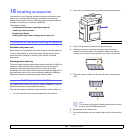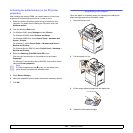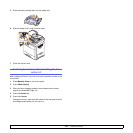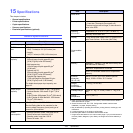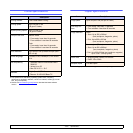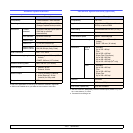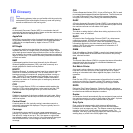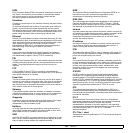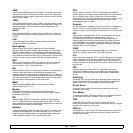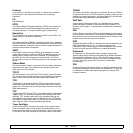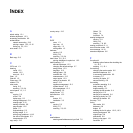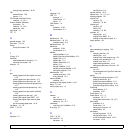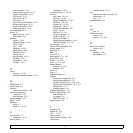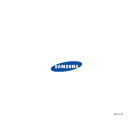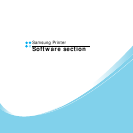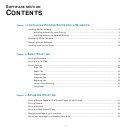
18.3 <
Glossary>
JBIG
Joint Bi-level Image Experts Group (JBIG) is an image compression
standard with no loss of accuracy or quality, which was designed for
compression of binary images, particularly for faxes, but can also be
used on other images.
JPEG
Joint Photographic Experts Group (JPEG) is a most commonly used
standard method of lossy compression for photographic images. It is
the format used for storing and transmitting photographs on the
World Wide Web.
LDAP
The Lightweight Directory Access Protocol (LDAP) is a networking
protocol for querying and modifying directory services running over
TCP/IP.
LED
A Light-Emitting Diode (LED) is a semiconductor device that
indicates the status of a machine.
MAC address
Media Access Control (MAC) address is a unique identifier
associated with a network adapter. MAC address is a unique 48-bit
identifier usually written as 12 hexadecimal characters grouped in
pairs (e. g., 00-00-0c-34-11-4e). This address is usually hard-coded
into a Network Interface Card (NIC) by its manufacturer, and used as
an aid for routers trying to locate machines on large networks.
MFP
Multi Function Peripheral (MFP) is an office machine that includes
the following functionality in one physical body, so as to have a
printer, a copier, a fax, a scanner and etc.
MH
Modified Huffman (MH) is a compression method for decreasing the
amount of data that needs to be transmitted between the fax
machines to transfer the image recommended by ITU-T T.4. MH is a
codebook-based run-length encoding scheme optimized to efficiently
compress white space. As most faxes consist mostly of white space,
this minimizes the transmission time of most faxes.
MMR
Modified Modified READ (MMR) is a compression method
recommended by ITU-T T.6.
Modem
A device that modulates a carrier signal to encode digital
information, and also demodulates such a carrier signal to decode
transmitted information.
MR
Modified Read (MR) is a compression method recommended by
ITU-T T.4. MR encodes the first scanned line using MH. The next
line is compared to the first, the differences determined, and then the
differences are encoded and transmitted.
NetWare
A network operating system developed by Novell, Inc. It initially used
cooperative multitasking to run various services on a PC, and the
network protocols were based on the archetypal Xerox XNS stack.
Today NetWare supports TCP/IP as well as IPX/SPX.
OPC
Organic Photo Conductor (OPC) is a mechanism that makes a
virtual image for print using a laser beam emitted from a laser printer,
and it is usually green or gray colored and a cylinder shaped.
An exposing unit of a drum is slowly worn away by its usage of the
printer, and it should be replaced appropriately since it gets
scratches from grits of a paper.
Originals
The first example of something, such as a document, photograph or
text, etc, which is copied, reproduced or translated to produce
others, but which is not itself copied or derived from something else.
OSI
Open Systems Interconnection (OSI) is a model developed by the
International Organization for Standardization (ISO) for
communications. OSI offers a standard, modular approach to
network design that divides the required set of complex functions
into manageable, self-contained, functional layers. The layers are,
from top to bottom, Application, Presentation, Session, Transport,
Network, Data Link and Physical.
PABX
A private automatic branch exchange (PABX) is an automatic
telephone switching system within a private enterprise.
PCL
Printer Command Language (PCL) is a Page Description Language
(PDL) developed by HP as a printer protocol and has become an
industry standard. Originally developed for early inkjet printers, PCL
has been released in varying levels for thermal, matrix printer, and
page printers.
PDF
Portable Document Format (PDF) is a proprietary file format
developed by Adobe Systems for representing two dimensional
documents in a device independent and resolution independent
format.
PostScript
PostScript (PS) is a page description language and programming
language used primarily in the electronic and desktop publishing
areas. - that is run in an interpreter to generate an image.
Printer Driver
A program used to send commands and transfer data from the
computer to the printer.
Print Media
The media like paper, envelopes, labels, and transparencies which
can be used on a printer, a scanner, a fax or, a copier.
PPM
Pages Per Minute (PPM) is a method of measurement for
determining how fast a printer works, meaning the number of pages
a printer can produce in one minute.
PRN file
An interface for a device driver, this allows software to interact with
the device driver using standard input/output system calls, which
simplifies many tasks.



